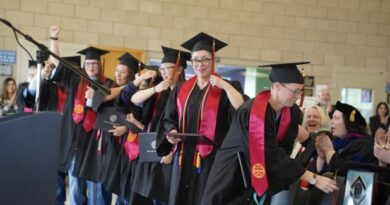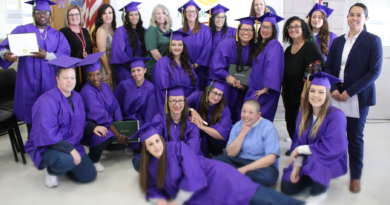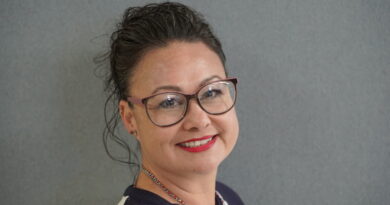CCWF’s first Surrogate Restorative Dialogue opens up space for healing

Editor’s note: last names have been withheld from this story for privacy.
Elle was on vacation when she received a phone call on Feb. 8, 2009, at 12:10 a.m. She was told that her daughter, Emily, had been struck by a truck and was on life support. Emily was 24 years old.
She then heard a terrible sound best described as “deep anguish,” Elle said. “Later I realized the sound was coming from me.”
A drunk driver hit Emily in a crosswalk after a long day of drinking. She flew 15 feet in the air and suffered blunt force trauma. She was declared brain dead. The driver had seven prior DUl’s and had done little time for them before.
According to data from the National Highway Traffic Safety Administration, driving under the influence of alcohol causes 32% of all traffic fatalities, 13,524 deaths in 2022, the latest year on record. It’s a choice people make when they are only thinking of themselves. People get a first DUI and still reoffend, breaking the law with the belief the rules do not apply to them. How can we make a change?
One way to is to step into a room where the problem is. Elle now has more than five years experience participating in an intentional coming-together of offenders and a victim of a similar crime, in a process called Surrogate Restorative Dialogue (SRD). On Sept. 27, 2024, Elle opened up about her loss with a group of women at the Central California Women’s Facility (CCWF).
The purpose of surrogate dialogue is for a perpetrator and a representative of their victim to share a space where mutual understanding, empathy for the impact on the victim, and forgiveness for the perpetrator can grow. It is a safe circle to listen to the victim’s story and not to be afraid to ask the uncomfortable questions. It is a time for accountability and expressing remorse. It is a chance to move forward.
This SRD, a first at CCWF, was facilitated by the Mend Collaborative, a non-profit organization dedicated to creating opportunities for healing and transformation for all survivors of violence.
Elle opened up the group’s session with two profound questions that set the tone of no judgment and vulnerability. “How many were raised with alcohol in the home?” she asked, “How many were raised with abuse in the home?” She delicately nodded her head to indicate that she already knew the whole room would lift their hand up. She spoke softly, saying how she could have easily been in one of their shoes.
Then she took the circle on a journey from pain to redemption. She poured love into the people who had committed the same crime that took her beloved daughter away. She gave her story and lifted everyone in the circle up with words like, “You are more than the worst thing you have done. You are worthy,” even though the purpose of this circle is to put themselves in their victim’s shoes.
The point of hearing from the victim’s standpoint is to prevent further repeat-offenders. Thanks to Elle’s grace and strength, the individuals present had a chance to embrace the pain and grow. Listening to Elle and the lifelong challenges she endures every day was not easy.
Still, one participant, Kendra, said, “I believe a lot of change could come from this.”
Cash, another participant, agreed; “I did not know how much I needed this until I saw you (Elle) walking up the path.”
Elle said she never imagined this being an outcome of Emily’s death.
Emily was an organ donor, so after the crash, she was put on a machine to keep her organs viable. She donated seven of her organs. Elle spent that night and the following morning with her, surrounded by friends and family. Elle shared a picture of Emily on life support and explained how she cut off locks of her hair to have something tangible of her daughter.
Emily was warm to touch; Elle described it as a very surreal feeling. When it was time to disconnect Emily, Elle felt unprepared. She was holding her daughter’s hand and what seemed like a long haul was only across the way. The nurses rolled her out to the other room and Elle heard in the distance, “You have to let go.”
“Grief is vicious,” Elle said. She went through stages of wanting to end her life. When she thought about Emily being so thoroughly gone, it became overwhelming. Elle’s mother once told her, “You have changed.” When Elle sarcastically replied, “Oh really?” her mom said she felt like she had lost two people.
Elle felt upset, but she knew she needed to change. One day she saw a sticker that read, “Love wins.” She questioned the sticker, thinking how love could make this better. That is when she made the decision to say “Yes” to life.
“Grief has not left but [I] learned how to carry it,” Elle told the group.
After Elle shared Emily’s story, the room was silent except for sniffles echoing off the walls. Tissue boxes passed around multiple times during the two hours. Last but not least, Elle opened up the circle for questions as people passed popcorn around.
Kaylee asked, “How long did it take for you to meet the offender?”
“Ten years to the day,” Elle said. “It took a journey of increments of forgiveness.”
In January 2019, Elle went to San Quentin State Prison and met the man who she once called, “the man who killed Emily.” She thought if he said yes to speaking with her, she might be able to see him in a different light.
All Elle could think while she was waiting for him to show up was, “I have a hug for him if he wanted it,” and “That was love.” She explained he looked weighed down.
After they hugged, he said, “Don’t you want to hit me?” Elle emphasized how she did not excuse his behavior, but understood it. For him to get to where he was on that day of her visit, he had to get help and face the reckless choices he made. He had to get through the shame and guilt to be able to take accountability and talk with Elle.
She said the biggest thing offenders could do is face the truth and take accountability for their choices.
Maggie, another participant, asked, “Is there anything that reminds you of Emily?”
One of the stories she told that really influenced the room was something that happened on Victim Impact Day during the sentencing of the man who killed Emily. Elle was at the back of the plane hoping to be alone, when she saw this cute Asian man walk towards her. She repeated to herself: “Please do not sit next to me, please do not.” Still, he did.
It was a gift, as it turned out. His partner had been killed by a drunk driver. They commiserated as the man expressed his grief; he wasn’t even able to make it back home before the family cleared his partner’s belongings out the apartment. He never even got to have a sweater of his beloved.
This man had many tattoos, eventually he got something for his partner. It was a tattoo of the first line of his favorite poem on his ribs. When he showed it to Elle, she was shocked. It was Emily’s favorite poem as well.
Giselle asked, “How could we honor Emily moving forward?”
The answer: forgive yourself, heal yourself, and know your triggers.
“I am not your victim,” Elle said, “but I am human and I want you to know I forgive each and every one of you guys.”
Special thanks to Velda Dobson-Davis for being supportive in the DUI community. Dobson Davis helped create Felons Against Distracted and Drunk Driving (FADDD) with a group of ladies with DUl’s who wanted to be proactive in preventing reoffenders in CCWF in 2019.




